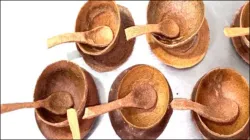Madhya Pradesh: Hotel management institute in Indore prepares edible crockery to replace plastic
The institute claims it will help people to choose alternatives to plastic and using edible crockery will also improve their health too. Besides, it can be easily destroyed if not eaten and the remains will work as fertiliser.

Indore: A hotel management institute in Indore has introduced an innovative solution to address plastic waste by creating edible crockery made from millets, aiming to replace the use of plastic and thermocol crockery.
State Institute of Hotel Management (SIHM) asserts that this initiative will encourage individuals to opt for alternatives to plastic, emphasizing that the use of edible crockery will also have positive health benefits. Additionally, the crockery can be easily disposed of, and if not consumed, the remnants can serve as fertilizer, contributing to environmental sustainability.
Here's what institute has to say on its innovative idea
Dr Vijay Kumar Singh, the Principal of SIHM, informed the news agency ANI that the inspiration for creating edible crockery from millets stemmed from Prime Minister Narendra Modi's emphasis on promoting millet grains. Subsequently, the institute initiated research in this direction.
"In view of today's health issue, we came up with this idea. It is quite good that people are moving towards organic food and there is awareness among them. But we see that plastic and thermocol are being used in food serving and packaging in parties. We have to overcome it, therefore, we started working to replace it, said Dr Singh.
"Since Prime Minister Narendra Modi has focused on promoting millet grains, we thought of making edible crockery from millets and started research on it. Slowly, we came to the conclusion that it can be done. After that we gave assignments to our students under two faculty members Vivek and Basant. Finally, we have made a complete set of edible crockery. Later on, we also get its lab testing to find whether there is any impact of fungal or bacterial growth in it and the report is successful," he added.
Millet crockery shelf life
Singh mentioned that they conducted tests on the shelf life of the millet crockery, determining that it can last for 30 days. The versatile crockery is suitable for serving all types of food, including warm, cold, liquid, semi-liquid, and solid items, without absorbing water.
"The ingredients used in making these crockeries majorly include ragi flour and sugar mixed together. Now, we have created it from the mold shape in the institute itself as a training facility. Since we are not commercial, we just want to percolate an idea in the market. We want that if it is adopted and its commercial utilisation is done in future then we can get relief from pollution," he added.
The principal further emphasized that consuming these crockery poses no harm, promoting an increase in millet intake in the body. Even if an individual chooses not to consume the crockery, it can easily decompose, thereby enhancing soil fertility, he said.
(With ANI inputs)